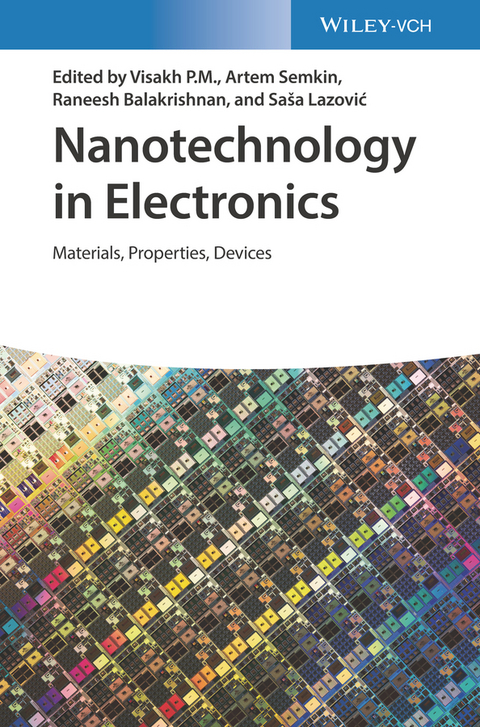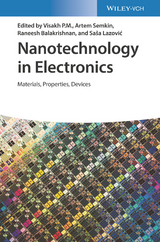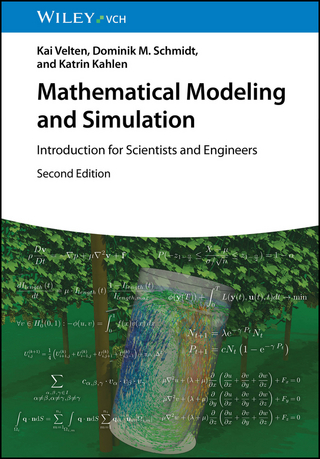Nanotechnology in Electronics
Wiley-VCH (Verlag)
978-3-527-34673-8 (ISBN)
Dr. Visakh P.M. is Assistant Professor at Tomsk State University, Tomsk, Russia. His research areas are polymer science, polymer nanocomposites, materials sciences, bio-nanocomposites, rubber-based nanocomposites, fire-retardant polymers and liquid crystalline polymers and silicon sensors. He published 17 original papers, three reviews and more than 30 book chapters. He is the editor of more than 25 books.Dr. Artem Semkin is research scientist in the Department of Microwave and Quantum Radio Engineering at Tomsk State University, Tomsk, Russia. His areas of research are polymer science, optics, photonics, photopolymers, liquid crystals, and photopolymeric and liquid-crystalline compositions.Dr. B. Raneesh is Assistant Professor in the Department of Physics, Catholicate College, Pathanamthitta, Kerala, India. His current research interests include nanomultiferroics, metal oxide thin films, plasma science and electron microscopy. He has published many research articles in peer-reviewed journals and also co-edited two books.Dr. Sasa Lazovic is Assistant Professor at the Institute of Physics Belgrade, Serbia. He is head of the Laboratory for Biomimetics since 2016 and has been leading the Innovation Center of the Institute of Physics Belgrade from 2014-2018. He has published more than 20 papers in international journals on plasma physics, materials science, and biophysics.
NANOTECHNOLOGY IN ELECTRONICS, MATERIALS PROPERTIES AND DEVICES: STATE OF ART AND CHALLENGES
Graphene-Based Nano-Electronics Biosensors
Zinc Oxide Piezoelectric Nanogenerators for Low-Frequency Applications
Investigation of the Hot Carrier Induced Degradation in Nanoscale Functionless MOSFETs: A Reliability-Based Analysis
Study of Electrostatic and Dispersion Forces in Nano-Electromechanical systems (NEMS)
Nanomaterials for Wearable, Flexible and Stretchable Strain/Pressure Sensors
Conductive Nanomaterials for Printed and Flexible Electronics Application
Metal Oxide Semiconductors for Non-Invasive Diagnosis of Breast Cancer
Down-Conversion Photoluminescence Properties of ZrO2:Ln3+ (Ln = Eu, Sm, Er, Tb, Ho, Tm, Pr, Gd, Dy) Films Formed by Plasma Electrolytic Oxidation
Multiferroics for Spintronics Applications
GRAPHENE-BASED NANOELECTRONICS BIOSENSORS
Introduction on Graphene
History of the Graphene
Properties of Graphene
Fundamentals of Graphene Derivatives
Synthesis of Graphene
Applications on Graphene-Based Biosensors
ZINC OXIDE PIEZOELECTRONIC NANOGENERATORS FOR LOW FREQUENZY APPLICATIONS
Introduction of Zinc Oxide
Introduction on Zinc Oxide Piezoelectric Nanogenerators
Zinc Oxide Piezoelectric Nanogenerators for Low Frequency Application
Conclusion
References
INVESTIGATION OF THE HOT JUNCTIONLESS MOSFETS: A RELIABILITY BASED ANALYSIS CARRIER INDUCED DEGRADATION IN NANOSCALE
Introduction
Overview of the Junctionless Paradigm
Simulation Framework of the Hot Carrier Degradation
Creation Process of the Interface Traps
Degradation of Performances Due to the Hot Carrier Effect
Hot Carrier Degradation in Digital Applications
Concluding Remarks
References
THE EFFECTS OF SYSTEM CONFIGURATION ON BEAM-BASED M/NEMS DEVICES
Introduction
Electrostatic Forces
Fringing Field Effects
Van der Waals Force
Casimir Force
Other Theories Related to the Casimir Force
Freestanding Phenomenon
Summary
References
NANOMATERIALS IN WEARABLE AND FLEXIBLE STRAIN/PRESSURE SENSORS
Introduction
Wearable Strain/Pressure Sensor
Applications
Conclusion and Outlook
References
CONDUCTIVE NANOMATERIALS FOR PRINTED AND FLEXIBLE ELECTRONICS APPLICATION
METAL OXIDE SEMICONDUCTORS FOR NON-INVASIVE DIAGNOSIS OF BREAST CANCER
DOWN-CONVERSION PHOTOLUMINESCENCE PROPERTIES OF ZrO2:Ln3+ (Ln = Eu, Sm, Er, Tb, Ho, Tm, Pr, Gd, Dy) FILMS FORMED BY PLASMA ELECTROLYTIC OXIDATION
Introduction
Experimental
Results and Discussion
CIE Chromaticity of ZrO2:Ln3+
Conclusion
MULTIFERROICS FOR SPINTRONICS APPLICATIONS
Magnetoelectric Multiferroic Materials
Spintronics
Spintronics Devices
Summary
QUARTZ TUNING FORM BASED NANOSENSORS
Introduction
Chemical Sensors
Quartz Tuning Forks (QTFs)
Early QTF Development
QTF as a Sensor
Conclusions
| Erscheinungsdatum | 02.11.2022 |
|---|---|
| Verlagsort | Weinheim |
| Sprache | englisch |
| Maße | 170 x 244 mm |
| Gewicht | 648 g |
| Themenwelt | Naturwissenschaften ► Chemie |
| Technik ► Elektrotechnik / Energietechnik | |
| Technik ► Maschinenbau | |
| Schlagworte | Electrical & Electronics Engineering • Electronic materials • Elektronische Materialien • Elektrotechnik u. Elektronik • Halbleiterphysik • Materials Science • Materialwissenschaften • Nanomaterialien • nanomaterials • Nanotechnologie • nanotechnology • Physics • Physik • Semiconductor physics |
| ISBN-10 | 3-527-34673-2 / 3527346732 |
| ISBN-13 | 978-3-527-34673-8 / 9783527346738 |
| Zustand | Neuware |
| Informationen gemäß Produktsicherheitsverordnung (GPSR) | |
| Haben Sie eine Frage zum Produkt? |
aus dem Bereich




